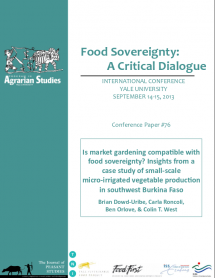Ideas into movement
Boost TNI's work
50 years. Hundreds of social struggles. Countless ideas turned into movement.
Support us as we celebrate our 50th anniversary in 2024.

An expansion of motorized market gardening is currently occurring throughout West Africa, in the same region where the Nyéléni Declaration was signed in 2007. With greater access to water – made possible by the adoption of diesel-powered water pumps– smallholder farmers have been able to rapidly expand their dry season food production.

In many ways this phenomenon embodies a food sovereign future: smallholder-led vegetable production for local markets, and relatively little government or multinational influence. Other aspects, however, reveal tensions with the principles of food sovereignty, including the use of Green Revolution technologies such as motorized pumps, improved and imported seed varieties and agrochemicals.
The article examines the explosion of market gardening in the Upper Comoé River Basin, Burkina Faso to analyze the implications of this emerging trend for Via Campesina, the leader of the global movement promoting food sovereignty. We compare key global food sovereignty formulations with the productive activities of market gardeners in the Upper Comoé sub-basin in southwestern Burkina Faso, and find that food sovereignty – as outlined by Via Campesina - leaves little room for incorporating market gardening-based livelihoods that depend on Green Revolution technologies.
We argue that Via Campesina can create conceptual space for the inclusion of technology dependent market gardening livelihoods by (1) focusing on how market gardening livelihood formation is a historical and self-determined process, and (2) treating its core principles as elements to strive towards rather than as criteria that must be met.
Doing so could help Via Campesina incorporate organizations that represent Green Revolution technology dependent livelihoods in underrepresented areas of the movement such as sub-Saharan Africa (SSA), the Middle East and Central Asia.
Brian Dowd-Uribe, Assistant Professor, Department of Environment and Development, University for Peace, Costa Rica Previously Brian Dowd-Uribe was a Post-Doctoral Research Scientist at Columbia University’s Center for Research on Environmental Decisions. He holds a PhD from the University of California, Santa Cruz.
Carla Roncoli, Senior Research Scientist, Department of Anthropology, and Associate Director of the Master’s in Development Practice, Emory University Carla Roncoli holds a PhD from the State University of New York, Binghamton.
Ben Orlove, School of International and Public Affairs at Columbia Ben Orlove is an anthropologist (PhD University of California, Berkeley) who teaches in the School of International and Public Affairs, where he also directs the Master’s Program in Climate and Society and the Center for Research on Environmental Decisions. He has published many books, including the recent Darkening Peaks: Glacier Retreat, Science, and Society.
Colin T. West, Anthropology, University of North Carolina, Chapel Hill Colin Thor West is a human ecologist with a PhD from the University of Arizona. He works on issues related to natural resource-based livelihoods and global change in semi-arid West Africa and western Alaska.
Food Sovereignty: a critical dialogue, 14 - 15 September, New Haven.